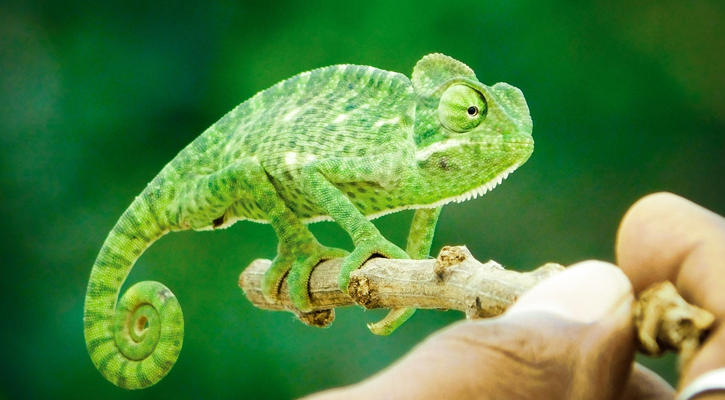Reptiles And Amphibians
Reptiles and amphibians can be great pets, providing us with a sense of adventure and fun. The study of reptiles and amphibians is called herpetology; this is why they are often referred to as “herps”. These fun creatures have truly unique requirements for them to live long, happy, healthy lives. Reptiles live solely on land; lizards, snakes, and turtles make up this category. Amphibians get their name because they live both on land and in the water; frogs, toads, and salamanders are the members of this family. While the two groups have their own unique requirements, they have many similarities.
Diet
While humans have domesticated many of these animals, their nutritional needs remain the same as their wild cousins. All herps need to be fed what they are designed to eat. This means the diet you feed your exotic should resemble the diet they would eat if they were in the wild. Since their diets vary greatly, please ask your veterinarian what an ideal diet for your pet should look like.
Enclosures
This is perhaps the most important factor in enabling your herp to have a fantastic life. Since both reptiles and amphibians are cold-blooded, proper UV lighting is crucial to their health and well-being. The UV lighting required is species specific and should be discussed with your veterinarian. Many herps are also sensitive to temperature and need proper thermoregulation year round since they do not hibernate when in captivity. Proper lighting can provide both UV exposure and temperature needs to be met. Please keep in mind that they require periods of darkness, as well as a place to hide and cool down if they decide they become hot.
Amphibians have additional enclosure requirements. Since amphibians are dependent on water sources to live, they need proper pools. The needs for the type and size of pool will vary by species. Amphibians also need a proper level of humidity; they typically live in tropical areas with high humidity levels. Be sure you are able to provide an enclosure that will maintain ideal humidity levels for your specific exotic.
Exercise
Most reptiles and amphibians will not need extensive amounts of exercise. Since they are cold-blooded, their energy levels and exercise requirements will vary based upon their body temperature. Generally, we suggest observing your pet and allowing them to decide how much they do or do not want to exert themselves. It is important to note the regular habits of your herp so you will be able to detect a change in behavior, which may signal they require medical attention.
Enrichment
Some owners of reptiles and amphibians may not realize their pet requires enrichment, just as common pets do. All herps are natural hunters. They play an important part of wild ecosystems in which they manage the population of many bugs and even some small exotic mammals, such as mice. Whenever possible, present your exotic with the opportunity to hunt for their food! This could include providing them with live food, or hiding their food in their enclosure for them to seek out. Hunting is the best form of enrichment for reptiles and amphibians.
Call Us Or Schedule An Appointment Online For Your Exotic Pet Today!
Explore Our Complete List of Veterinary Services in Colorado Springs, CO
- Same-Day Care
- End Of Life Services
- Kitten Care
- Puppy Care
- Exotic Mammals
- Birds
- Pharmacy & RX Refill
- Exotic Pets
- Anesthesia
- Preventative/Wellness Care for Cats
- Preventative/Wellness Care for Dogs
- Laser Therapy
- Acupuncture
- Spay & Neuter
- Vaccinations
- Parasite Prevention
- Dermatology
- Wellness Exams
- Behavior
- Dental Care
- Nutrition
- Surgery
- Diagnostics
- Senior Wellness
- Microchipping
- Emergency and Urgent Care

Come See Us
1815 Dublin Blvd.,
Colorado Springs, CO 80918
